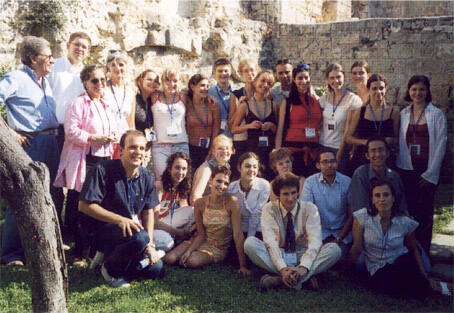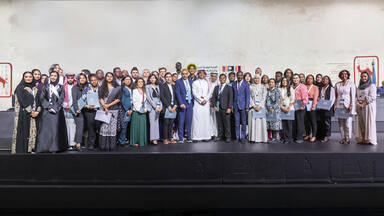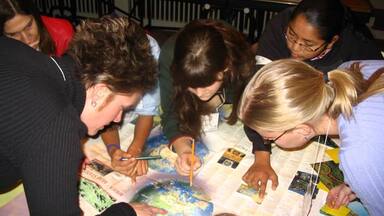During the 7th International Symposium of the Organization of World Heritage Cities (OWHC) in Rhodes, Greece (23-26 September) a Youth Forum was held within the framework of the UNESCO World Heritage in Young Hands Project . The forum was attended by 19 young people between 18 and 20 years of age, who met at the Marc de Montalembert Foundation in the heart of the medieval city of Rhodes.
In January 2002 the OWHC asked mayors to select young people who would develop and implement projects on awareness raising related to heritage preservation. Throughout 2003 the selected youths engaged in a variety of activities in their cities. They made map games with stickers for children, produced documentaries, radio programs, CDs and postcards, all relating to the issues of their city's heritage. They also organized outdoor activities and exhibitions for young adults in their community. Festivals and concerts were ideal occasions to reach out to other young people. They talked to older generations to learn stories about the past and explained heritage to the younger children.
At the Forum in Rhodes the young people shared their experiences, difficulties and successes among themselves. 'Discussions and exchanges among the young people were incredibly lively and motivated and the quality of the presentations was very high. The spirit of tolerance and interest in other cultures thoroughly marked this event', said Vesna Vujicic-Lugassy, responsible for the World Heritage in Young Hands Project at the WHC.
The conclusions and recommendations of the Youth Forum were then passed on to the mayors, scientists and decision makers attending the 7th Symposium of the OWHC and received strong support from them. The young people particularly underlined the need to establish regular forms of co-operation between the youth and decision makers and to include specific funding reserved for young people's heritage activities in the municipalities' annual budgets. Establishing networks, both on the municipal level and on the international level - through the OWHC network - was one of the key issues for future involvement, they stressed. As one of the young participants in the Forum, Miss Dagnija Baltina from Riga, Latvia said: '1 + 1 may make 3 if our endeavors are based on true partnership rather than isolation or rivalry'.
Message and recommendations as presented at and endorsed by the final plenary of the Symposium
Message
We join again after three hard working days and we are not ashamed of what was accomplished. This is a concise overview of the Youth Forum and what it agreed to be its message.
Everyone has put their heart, mind and love into one common goal: raise awareness about our local and world heritage. We shared the lessons of the projects each of us had just carried out in his or her own heritage city in a huge diversity of situations. And truly despite the cultural diversity the youth of the world is the same everywhere. Thus there are a number of common points that we made in our discussions.
In different cities of the world young people are cooperating to learn about heritage. Heritage can be perceived as something boring to young people, they want to have it presented in an attractive manner with more colorful and lively elements. We want young people to learn by playing. For children we made funny maps with stickers, comics and drawing competitions. For young adults outdoor activities were carried out. Discovering heritage was linked to listening to music, and we made exhibitions. We produced some radio programs, CD, homepages, movies and postcards. We talked to other generations to learn the stories of the past and we explained heritage to young children. We joined restoration and voluntary works for heritage preservation.
We want to preserve also our intangible heritage - our traditions, festivals and music - and use it as tools to raise interest for heritage among young people. The heritage of our cities is not only the most popular houses or the most exploited monuments on postcards as there are still plenty of less famous objects and traditions we just pass by. And these are most vulnerable as they can disappear from the minds of locals even within a single generation. We would like to use these almost forgotten, but for us very alluring and interesting things, as tools to raise interest for heritage among young people. Seeing the material heritage through the intangible gives it new look with colorful and lively elements.
Special heritage days, solidarity days help a lot to raise awareness by giving us an occasion to join the preservation activities. And so does the involvement of people in a variety of projects and activities independently from the initiatives of municipalities. It is a way to prove to the adults and to the youth that the spirit of the local and world heritage will live on through generations. As was stressed by our discussions we often miss encouragement, trust and motivation.
It is important to feel included in our cities. We need to see and perceive that our native places are not only dedicated to tourists but also to us, young people, in order to value cultural and historical heritage as much as clubs and discos! As one participant said, getting lost in our own city because you do not know it leads you to a sense of lack of ownership and shame.
Remember: 1 + 1 may make 3!!!! if our endeavors are based on true partnership rather than isolation or rivalry!
Recommendations
And now our suggestions and recommendations. Having observed how much young people can do to promote the heritage we are strongly convinced that we are the ones who can help a lot and inspire our mayors and municipalities. Awareness of other young people and children has been very effectively raised through the projects we have implemented.
But there always appear some difficulties, which can be strong obstacles even through the best programs.
Some of the Youth Forum participants have unfortunately encountered problems from the side of the decision makers. While generally we must appreciate the fulfilling and positive attitudes towards our projects we also noticed that even more support could have been given.
Several projects had to be changed already in the course of implementation due to difficulties such as: lack of financial support, impossibility to cut through the established school system or regular bureaucracy. Sometimes we felt a lack of appreciation and communication with the municipalities. Anyway our successful projects have shown that there is a real need of establishing regular forms of cooperation between the youth and the decision makers.
Therefore on the basis of our experiences we would like to present to you five recommendations to include in your guidelines for the next two years:
- To make town halls more accessible to young people by installing separate reception desks for young people;
- To include in the municipalities' annual budgets a separate envelope reserved to young people heritage activities, thus giving them the opportunity to implement their ideas;
- To organize voluntary hands-on workshops on restoration and preservation projects;
- To allow two types of networks for exchanging on World Heritage awareness raising activities;
Firstly at the local level through the municipality schools network and associations;
Secondly at international level by using the OWHC mayors network; - To create youth city councils of elected young people who will participate in the implementation of activities in cities.
Finally on behalf of all the participants of the Youth Forum we would like to express our great satisfaction after having taken part in the Symposium. We feel it has been a very successful event and we look forward to see our recommendations in action.
We also want to thank very much all of those who made it possible and have helped us over these last three days.


